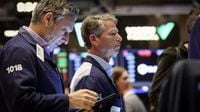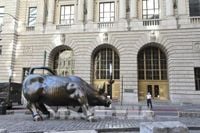The U.S. stock market experienced a notable decline on Thursday, March 27, 2025, reflecting growing investor anxiety over President Donald Trump's recent tariff announcements. The Dow Jones Industrial Average fell by 155.09 points, or 0.37%, closing at 42,299.7 points. Similarly, the S&P 500 dropped 0.33% to 5,693.31 points, while the Nasdaq Composite saw a decrease of 0.53%, settling at 17,804.03 points.
Investor concerns were largely driven by Trump's announcement of a 25% tariff on "all cars not made in the U.S.," which is set to take effect on April 3, 2025. This decision sent shockwaves through the automotive industry, leading to a significant drop in stock prices for major automakers. General Motors (GM) saw its stock plummet by more than 7%, and Ford's shares fell nearly 4%. In contrast, Tesla's stock rose slightly by 0.4%, as analysts believe the electric vehicle manufacturer, which produces a significant portion of its cars domestically, may benefit from the new tariffs.
Adding to the uncertainty, Trump indicated that on April 2, 2025, he plans to impose reciprocal tariffs on all trading partners that have enacted tariffs or utilized non-tariff barriers against U.S. goods. During a press conference, Trump warned that if the European Union (EU) and Canada retaliate against U.S. tariffs, he would impose "much higher" tariffs on these partners. This declaration further fueled fears among investors regarding the potential for an escalating trade war.
Sameer Samana, a strategist at Wells Fargo Investment Institute, commented on the situation, stating, "The inconsistent nature of Trump's policies is causing unease among investors. It's not just about the policies themselves, but how they are implemented." He emphasized that a clear framework for trade and tariffs in the coming weeks would help businesses and consumers make informed decisions. Samana noted, "What we are seeing right now is akin to a short-term shock, and things could revert back to normal soon enough."
Jed Ellerbroek, a portfolio manager at Argent Capital, echoed similar sentiments, expressing that investor caution stems from Trump's unpredictability. "Investors are genuinely worried about Trump and his policies. It's not so much the policies themselves but the inconsistency that makes both investors and businesses hesitant to make long-term investment decisions," he remarked.
In the energy sector, crude oil prices saw a slight uptick despite the pressures from Trump's tariffs. Brent crude oil futures in London rose by $0.24 per barrel, or 0.3%, to settle at $74.03 per barrel. Meanwhile, West Texas Intermediate (WTI) crude oil futures in New York increased by $0.27 per barrel, reaching $69.92 per barrel. This marked the highest closing price for both types of oil in a month.
Analysts attribute the increase in oil prices to concerns over supply tightness, exacerbated by Trump's recent sanctions related to oil purchases from Venezuela. Earlier this week, Trump announced a 25% tariff on countries that buy oil from Venezuela, alongside sanctions targeting entities supporting Iran's oil export activities. Despite these pressures, analysts believe that oil prices are unlikely to see significant short-term gains. Phil Flynn, a senior analyst at Price Futures Group, stated, "The biggest hurdle for oil prices right now is the fear surrounding tariffs. Tariffs will weaken oil demand."
The broader economic landscape remains uncertain, with signs of weakness emerging in the world's largest economy. Inflation has yet to recede to the Federal Reserve's target of 2%, raising concerns about the overall health of the U.S. economy. In light of these developments, the bond market has not compensated for the stagnation in the stock market, signaling investor apprehension.
As the situation continues to unfold, the impact of Trump's trade policies on both the stock and energy markets remains a focal point for investors. The potential for further tariffs and the administration's approach to trade negotiations will be closely monitored in the coming weeks.





